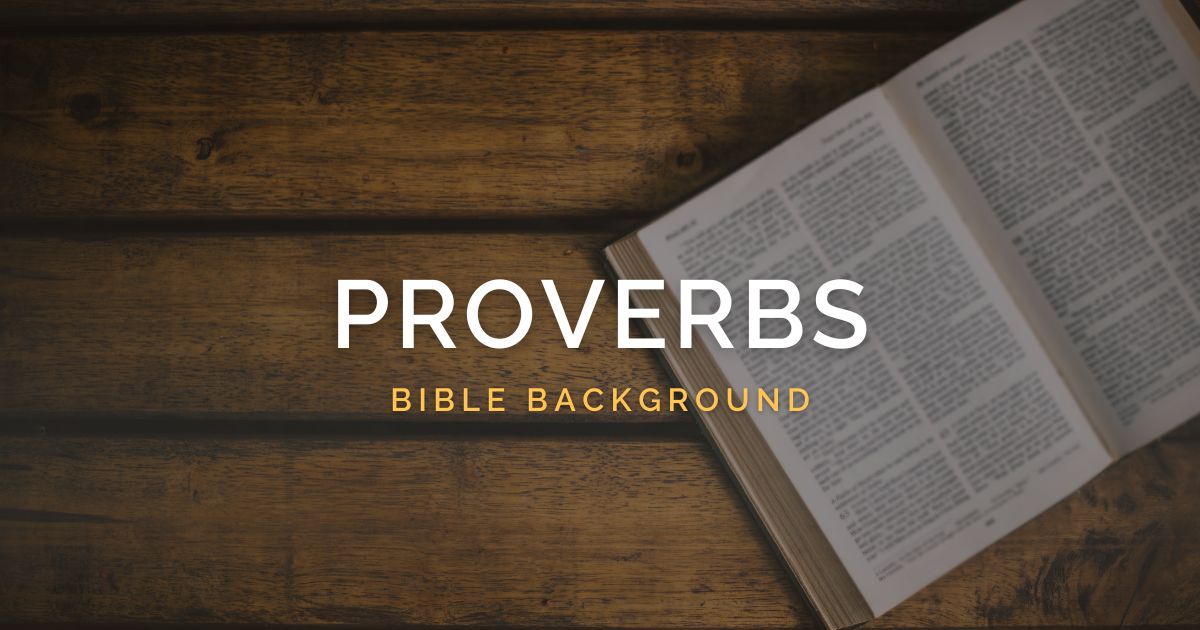Who
King Solomon, Agur, and King Lemuel to the king’s sons, and by extension all Israel, during the united Kingdom of Israel of Solomon’s reign
Where & When
Proverbs is a book full of the counsel and wisdom of Yahweh, the God of Israel. Proverbs contains longer sections of instruction, but also hundreds of independent aphorisms crafted and transmitted by the kings of Israel throughout their history. Though composed mostly by Solomon, chapter 30 was composed by Agur and chapter 31 by King Lemuel. These two wise men may have been foreign kings faithful to Yahweh and known to Solomon during his great reign over Israel. If these kings lived in the same era as Solomon, a date of composition for Proverbs may be between 959 BC and 940 BC. Proverbs communicates the wisdom of Solomon during the great glory of his kingdom in Israel as the most powerful, beautiful, and wise kingdom of the earth. The proverbs were probably crafted mostly in Jerusalem by Solomon, though Agur and Lemuel may have composed their proverbs in their own countries, which are unknown. Solomon reigns as the “potential” (not actual) Messiah-king to usher in the Kingdom of God and invite all the world to exclusive worship of Yahweh alone. Proverbs showcases the supreme wisdom of the God of Israel in the context of the gods of the nations. Proverbs is also the Law of Moses lived out day to day, and therefore, the outcomes of this wisdom apply most effectively in the future Millennial Kingdom, although, believers throughout all eras of history can regularly witness these outcomes when applied in their lives, even if they are not as consistent as what will be in the Millennial Kingdom.
Why
To instruct Israel’s future kings (and by implication, all Israelites and people of the earth) how to wisely apply the Law of Yahweh into the complexities of everyday life with a view toward life in the Kingdom of God, and thereby experience the full blessings of the Noahic Covenant, Abrahamic Covenant, Mosaic Covenant, and Davidic Covenant.
How
Be paying attention to these important terms that occur in this book:
- Wisdom (or Wise)
- Fear of Yahweh
- (My) Son
- Righteous (or Righteousness)
- Wicked (or Wickedness, Guilt, Evil)
- Heart
Arguably, Proverbs is not a random assortment of sayings from chapters 10 to 29, but rather a cleverly organized unit to communicate deep truths through its structure. Every reader of Proverbs gains something from it, but its complex structure affords the student of Proverbs an almost endless storehouse of treasures from which to learn.
Literary Outline
The outline of Proverbs is grammatically anchored to introductory statements found in these verses (Prov. 1:1; 10:1; 22:17; 24:23; 25:1; 30:1; 31:1).
- Prov. 1:1 – 9:18 Collection I: Beginner’s Wisdom
- Prov. 10:1 – 22:16 Collection II: Intermediate Wisdom, Part 1
- Prov. 22:17 – 24:22 Collection III: Intermediate Wisdom, Part 2
- Prov. 24:23–34 Collection IV: Intermediate Wisdom, Part 3
- Prov. 25:1 – 29:27 Collection V: Intermediate Wisdom, Part 4
- Prov. 30:1–33 Collection VI: Advanced Wisdom, Part 1
- Prov. 31:1–31 Collection VII: Advanced Wisdom, Part 2
